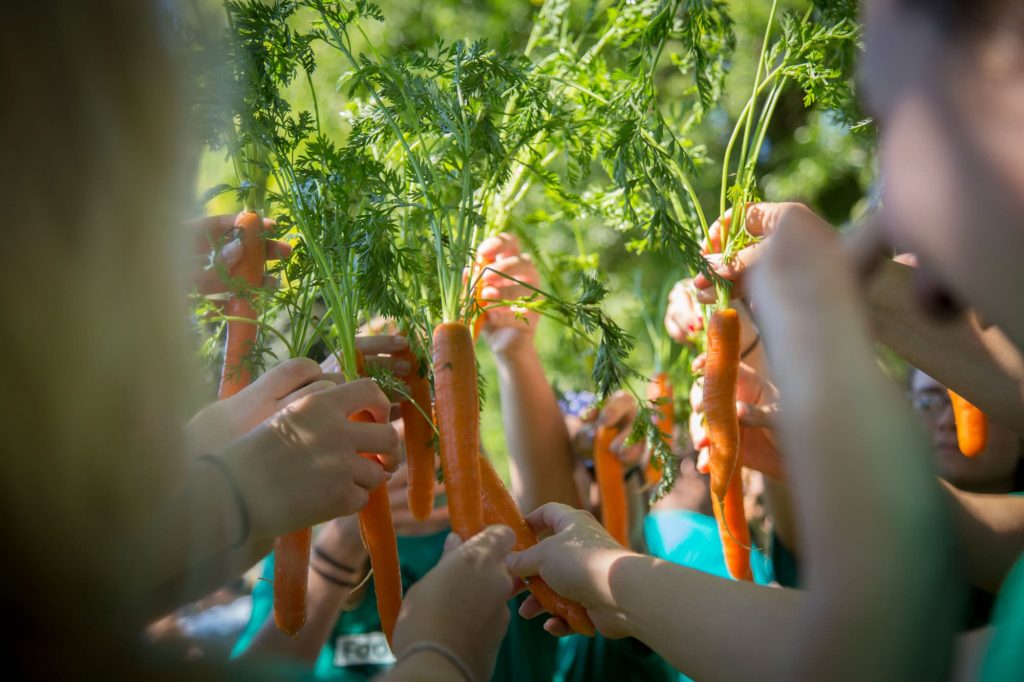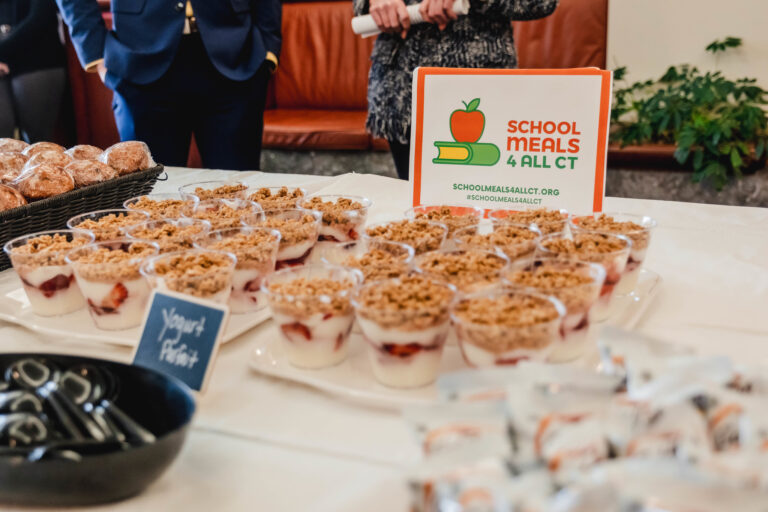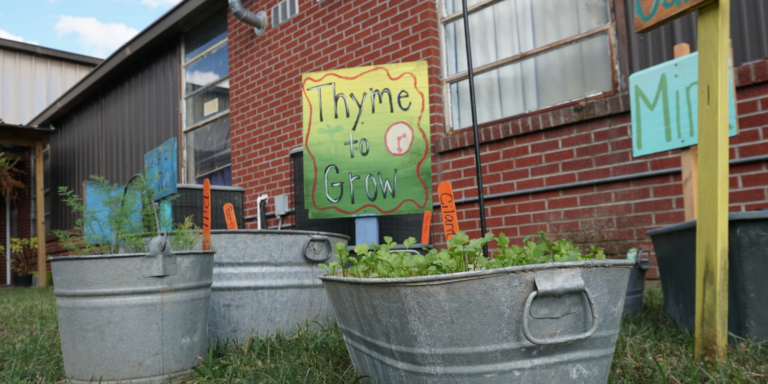Our 2021 Policy Year in Review
In 2021, FoodCorps worked alongside thousands of advocates and partners to support important federal and state policies. Here’s an overview.
In 2021, FoodCorps worked alongside thousands of advocates and partners to support important federal and state policies. Here’s an overview.

The past year has brought a flurry of policy changes and wins, as well as unprecedented levels of advocacy for FoodCorps. Like in 2020, all of this year’s advocacy occurred in the context of a global pandemic, which illuminated high hunger and poverty rates like never before and added a sense of urgency to every policy action.
This year, FoodCorps activated thousands of advocates and partner organizations to support important federal and state policies, and built coalitions that will reap many policy wins moving forward. We encouraged our networks to take action on numerous policy initiatives, and forged relationships that will strengthen our work in the future. Here’s a glimpse at the past year in FoodCorps policy.
In January, President Joe Biden took office, and with him a Democratic majority U.S. Congress. The new administration brought in a renewed focus on the needs of families with children, especially those impacted by job loss in the face of the pandemic.
In his first week, President Biden enacted several executive actions to address food insecurity, including:
In addition, our former Policy Director, Kumar Chandran, left FoodCorps to take the role of Senior Adviser for Nutrition in the Office of the Secretary at the Department of Agriculture. Secretary Tom Vilsack is serving his second term in the Secretary role after previously serving with the Obama Administration.
One of President Biden’s immediate actions was the signing of the American Rescue Plan, which lifted millions of children out of poverty. This plan brought direct payments to families with children, aiding families who were impacted by the COVID-19 pandemic and resulting economic crisis. According to the U.S. Treasury Department, 90 million direct payments have been disbursed, totalling more than $242 billion of much-needed relief sent to families. American families with children are using these payments for food, housing, utility bills, and education.
Rather than waiting to claim these benefits during the 2022 tax season, families with children were given advanced cash payments during 2021. These “true-up” advanced payments have been credited for significantly lowering child poverty rates. Eligible families now automatically receive an Economic Impact Payment of up to $1,400 for individuals or $2,800 for married couples, plus $1,400 for each dependent. These payments are set to expire at the end of 2021; however, the Build Back Better Act would extend these payments through 2022 and make the policy permanent.
The U.S. Department of Agriculture (USDA) announced in April 2021 that free meals would be available to all students during the 2021-2022 school year. This offered a huge boost to families and kids, as free meals would be provided to all students regardless of their financial status.
This policy is a cornerstone of FoodCorps’ policy vision. Free school meals for all policies not only eliminate the stigma of being financially eligible for free and reduced-price school meals, but also greatly benefit school districts who receive more funding to provide school meals. This policy also sets an important precedent by acknowledging that good nutrition is key to students’ achievement at school.
FoodCorps spent the first half of 2021 advocating for Child Nutrition Reauthorization, the process of renewing laws governing child nutrition. In particular, we advocated for four key bills to be included in the legislation (learn more about each one here):
FoodCorps is currently in planning conversations with congressional staff in the House Education and Labor Committee, as well as the Senate Agriculture Committee, to move forward with CNR in 2022. While this legislation has been tabled for possible 2022 action, many of FoodCorps CNR goals have been addressed in…
The House of Representatives passed President Biden’s economic agenda, known as the Build Back Better Act, in late November. The legislation is currently before the Senate. Last week, Senate Majority Leader Chuck Schumer, D-N.Y. wrote in a letter to his colleagues that his goal is to have the measure approved by Christmas.
Just in time for this landmark legislation, Jessica Montoya joined FoodCorps as Policy Director in September and brought her expertise to immediately advocate for passage of this bill. She has conducted over 50 meetings with grassroots partners and congressional staff in support of the Build Back Better Act and in order to lay the groundwork for CNR in 2022.
In addition, FoodCorps joined hundreds of other schools and organizations to urge Congressional leadership to keep children a priority in this once-in-a-generation opportunity, including sending a letter recently with more than 100 signatures from partner organizations.
FoodCorps applauded policymakers’ actions to keep provisions intact around school meals, kitchen upgrades, and nutrition education. Although we were disappointed that the funding was pared down, we see this legislation as significant progress and an important down payment on future child nutrition programs.
The current legislation includes:
A number of states ushered in important policy wins. Here are a few we were particularly excited about:
As communities everywhere continue to recover from the pandemic, people and businesses around the world are facing major supply chain issues from delays to product shortages and price increases—and school food is no exception. In response, the USDA announced $1.5 billion in funding to states as well as some program flexibilities to help schools navigate the supply chain challenges.
While staff and food shortages are felt by many school districts across the country, some school nutrition programs with local vendor relationships and scratch cooking already in place report fewer supply chain issues, which illustrates how farm to school and local procurement contributes to creating a resilient food system.
In 2022, FoodCorps will continue to work with legislators to advance our policy priorities through passage and implementation of the Build Back Better Act and Child Nutrition Reauthorization. Although timing is uncertain, FoodCorps will have renewed focus and conduct more advocacy to urge Congress to pass these important pieces of legislation.
Furthermore, 2022 is an election year, and many are already predicting that the the House of Representatives will be controlled by a Republican majority. This will make passing legislation and advancing FoodCorps’ agenda more difficult because of likely partisan gridlock. As such, we will continue to advocate as much as possible to advance our legislative priorities with our current Congress.
As always, we will continue to advocate for the ideal laid out in our Policy Vision: to dismantle the systemic inequities in our food and education systems so that every child—regardless of race, place, or class—gets the nourishment they need to thrive.
Stay connected to FoodCorps! Sign up for our policy emails and be the first to know when to raise your voice.

The Policy Brief, March/April 2024: WIC is Fully Funded

What Makes a Great School Garden?

5 Delicious Spring Recipes to Cook With Kids